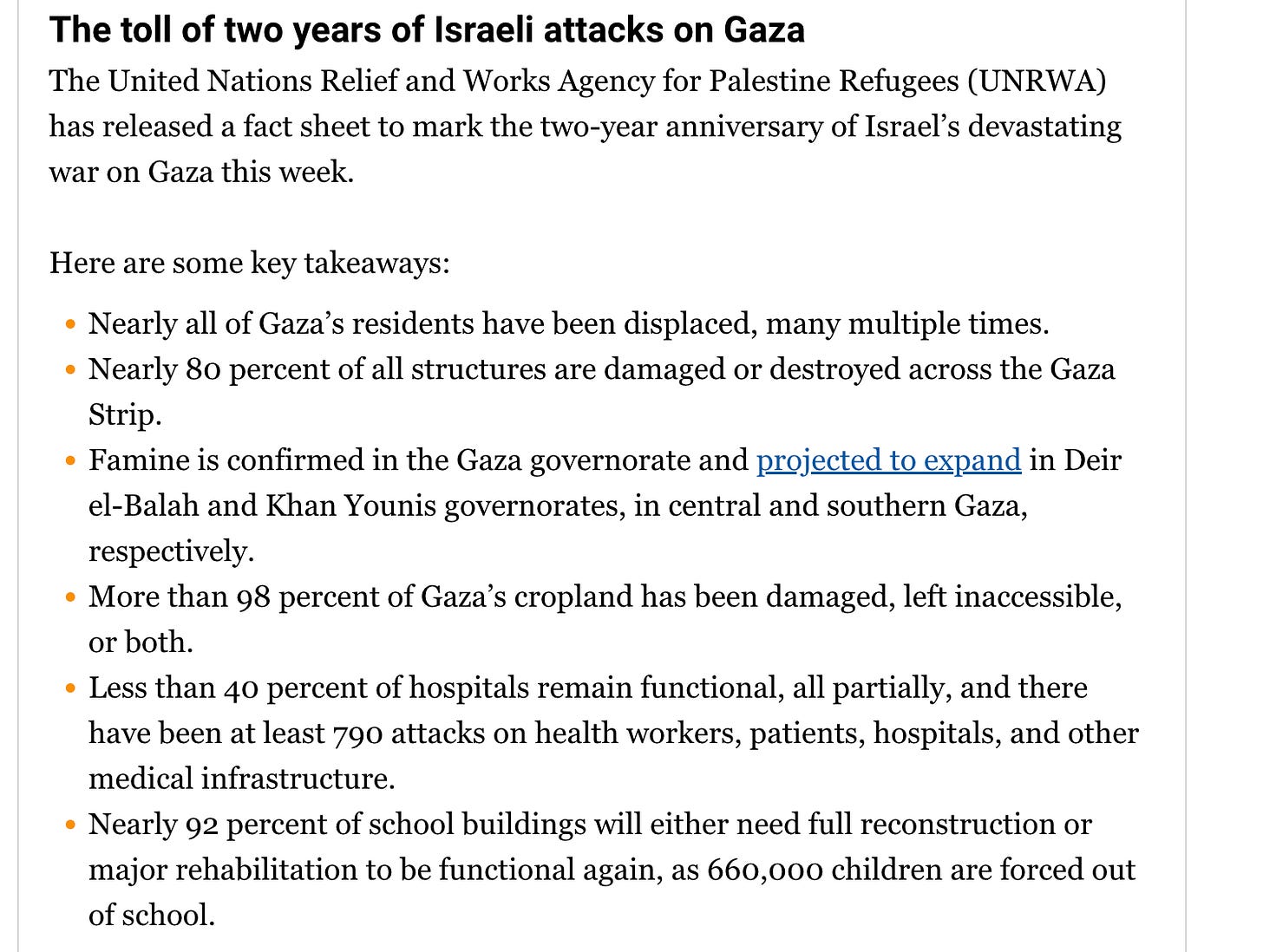Trump’s Middle East Gamble: Peace, Power, or the Nobel Prize?
Two years after Hamas’s bloody assault on Israel, new talks open in Cairo—this time with Donald Trump’s envoys at the table. Could this finally bring peace, or is it another mirage in the desert?

Tuesday marks the second anniversary of the Hamas terror attack that killed 1,200 people and kidnapped 240 others. As that grim milestone approaches, new peace talks open in Cairo—hosted by Egypt, attended by Israeli and Hamas envoys, and, notably, featuring two of President Trump’s so-called “peace envoys.”
We’ve been here before. Many times. Moments when an elusive deal between Hamas and Israel appeared within reach—only to evaporate amid mutual distrust, political survival instincts, and outside meddling. What’s different this time is Trump’s personal stake: by leaning on a politically weakened Benjamin Netanyahu, he’s gambling on a breakthrough that could burnish his legacy—or earn him a Nobel Peace Prize. Undoubtedly, Netanyahu’s unilateral strike on Qatar—a key U.S. ally in the Middle East—without the knowledge of the Trump White House (or so we were told), forced him to surrender the last vestiges of his ability to act independently.
The proposed deal envisions the release of 48 remaining hostages—alive and dead—in exchange for Palestinian prisoners held in Israel. But critics say the plan is dangerously shallow. Gaza would be governed by a Trump-chaired “Board of Peace,” while Hamas insists on a technocratic Palestinian administration. There’s no mention of statehood, and Hamas refuses to disarm (a key Israeli demand).
Inside Israel, the far-right threatens to torpedo any deal. Finance Minister Bezalel Smotrich warns it will “end in tears.” And yet, the families of the hostages—who have evolved into one of the country’s most effective lobbying movements—are pressing Netanyahu to accept even an imperfect peace.
Meanwhile, Gaza remains in ruins: millions displaced, hunger rampant, and almost no infrastructure left standing. Two years later, the region is still trapped in cycles of vengeance and despair.
As the Jerusalem Post wrote, “If an imperfect deal is what brings home the hostages, then we need to accept it.” Perhaps this week, imperfection may be the closest thing to peace the region can get.
Secretary of State Marco Rubio said Sunday that the U.S. was hoping for a quick deal to bring home all hostages in Gaza in exchange for a partial Israeli withdrawal from the territory as Israel and Hamas headed into a new round negotiations. Mr. Rubio, speaking to NBC’s “Meet the Press,” acknowledged that the next phase of negotiations on President Trump’s plan to end the Gaza war would be tougher, touching on fraught issues such as disarming Hamas and setting up a new government for Gaza that excludes the Palestinian militant group. Asked whether the two-year-old war was over, Mr. Rubio responded: “Well not yet. There’s some work remains to be done.” He went on to say that Hamas had “agreed to the president’s hostage release framework.” Mr. Rubio spoke a day before a new round of indirect negotiations between Israel and Hamas, conducted through mediators, was expected to begin in the Egyptian capital of Cairo. Ron Dermer, a close aide to Prime Minister Benjamin Netanyahu of Israel, will lead Israel’s delegation. Hamas officials did not respond to requests for comment on who would attend from their side. The Cairo talks are expected to focus on swapping the remaining hostages held in Gaza for Palestinian prisoners — one component in the sweeping proposal released by Mr. Trump last week. Mr. Rubio suggested that this focus would leave negotiations on other formidable obstacles to ending the war until a later stage. Israel believes that about 20 living hostages still remain in Gaza, as well as the bodies of at least 25 others. It is unclear whether Hamas would free the hostages before concluding the rest of an agreement to end the war as it views the captives as the most significant leverage it has with Israel. Mr. Trump’s proposal demands that Hamas return all of the surviving captives and the bodies in its possession within 72 hours of Israel agreeing to the cease-fire. “I will not tolerate delay, which many think will happen, or any outcome where Gaza poses a threat again. Let’s get this done, FAST,” Mr. Trump said in a post on social media on Saturday. The president’s plan envisions the creation of a Palestinian government supervised by an international “Board of Peace” led by Mr. Trump as chairman and a postwar security force drawn from foreign countries, as well as the disarming of Hamas - NYT
Above, have a listen to my live interview from Odesa this morning on the UK’s LBC Radio. I spoke to host, Sandy Warr, about the overnight Russian strikes on Ukraine (see new item below), how a possible peace deal with Gaza might impact Ukraine, and the benefit Ukraine is reaping in Russia with upgraded US intelligence and more power kit
Ukrainian President Volodymyr Zelensky said that at least five people were killed, and 10 others were wounded in a “combined Russian attack,” which involved more than 50 missiles and about 500 drones overnight. The strikes cut off electricity for tens of thousands of people and damaged buildings and infrastructure. Ukraine’s air force said that the entire country was put under air raid alerts for several hours, with the most dire warnings of missile and drone strikes issued for the western Lviv region. Local authorities said at least two people were killed in the strikes which also left some areas without electricity. Andriy Sadoviy, the mayor of the provincial capital, Lviv, said the city’s air defense systems were heavily engaged in repelling Russian drone and missile attacks. Some parts of the city were left without power and public transport was yet to start running. Sadoviy warned residents that it was “dangerous to go out into the streets.” In the city of Zaporizhzhya, Governor Ivan Fedorov said on Telegram that a Russian “combined strike” had killed a woman and wounded nine other people. Meantime, the Russian-held Zaporizhzhya nuclear power plant, located some 55 kilometers southwest of the city of Zaporizhzhya has been cut off from external power since September 23. The latest strikes also targeted the Ivano-Frankivsk region in western Ukraine as well as Chernihiv, Kharkiv, and Sumy provinces in the north and northeast, Odesa Oblast in the south, and the central Kirovohrad region, according to the Telegram post by Zelensky - RFE/RL
NATO member Poland said it scrambled aircraft early on Sunday to ensure its air safety after Russia launched airstrikes on Ukraine. “Polish and allied aircraft are operating in our airspace, while ground-based air defence and radar reconnaissance systems have been brought to the highest state of readiness,” Poland’s operational command said in a post on X. Eastern-flank NATO members are on high alert after Poland shot down suspected Russian drones in its airspace in September and drone sightings and air incursions, including in Copenhagen and Munich, have led to chaos in European aviation. Lithuania’s airport in Vilnius was closed for several hours overnight after reports of a possible series of balloons heading towards the airport late on Saturday. According to flight tracking service Flightradar24, early on Sunday, commercial flights were using routings typically used when Poland’s Lublin and Rzeszow airports near the border with Ukraine were closed - TVP World (Poland)
Tbilisi remained tense after a night of clashes between protesters and riot police during local elections that saw the ruling Georgian Dream party tighten its grip on power amid opposition boycotts and growing Western concern that the country is drifting closer to Moscow. The unrest marked one of the most serious challenges to the government in months, coming as thousands rallied against what they called an increasingly authoritarian government. On October 4, Georgian riot police used pepper spray and water cannons to drive protesters away from the presidential palace in the capital and detained at least five leaders of the opposition demonstrations. Deputy Interior Minister Aleksandre Darakhvelidze said the detainees had been taken into custody, including activists and protest organizers Paata Burchuladze and Murtaz Zodelava. Those detained “are accused of violently changing the constitutional order of Georgia or calling for the overthrow of the state government, as well as organizing, leading, and participating in group violence. The crimes envisage up to nine years in prison,” Darakhvelidze said. Their status as of early October 5 was not clear. Prime Minister Irakli Kobakhidze said the attempt to “overthrow” the government had failed and that those who participated in it would be “severely punished.” He added that “strict measures” would be implemented in the coming days following the protest, which appeared to be mostly broken up by around midnight local time. Preliminary official results from the October 4 local elections had Georgian Dream claiming to have won control in every municipality in a vote boycotted by much of the opposition amid fears the results could be falsified by authorities - RFE/RL
Billionaire Andrej Babiš and his ANO (YES) movement have won Czechia’s parliamentary elections with 34.6 percent of the vote, partial results indicated on Saturday. With around 99 percent of votes counted, ANO looked poised to take power from Prime Minister Petr Fiala’s pro-Western coalition who won around 23.3% of the vote this year. The major anti-migrant force, the Freedom and Direct Democracy party got 8.3% while a right-wing group calling itself the Motorists for Themselves party received 7.1%. The two are potential partners for Babiš, who with 86 seats will need the support of another party to form a coalition. He has ruled out cooperation with the other five parties that were in government after the 2021 election, in which he lost. With the victory, Babiš would join the ranks of Prime Ministers Viktor Orbán of Hungary and Robert Fico of Slovakia, whose countries have refused to provide military aid to Ukraine, continue to import Russian oil and oppose European Union sanctions on Russia. The Czech Republic has been a staunch supporter of Ukraine since Russia’s full-scale invasion in February 2022. The country has donated arms including heavy weaponry. Babiš has questioned such support and also refused to fully endorse a NATO commitment to significantly increase defence spending - Euronews
Fewer Americans have confidence in newspapers, television, and other forms of mass media than ever before. Twenty-eight percent of US adults report having a “great deal” or “fair amount” of trust that mass media will report the news fully, accurately, and fairly, according to new Gallup polling, the first time that figure has fallen below 30%. There’s a clear partisan divide, with far fewer Republicans expressing confidence in mass media (8%) than Democrats (51%) and independents (27%), though the latter two groups still express historically low trust. The polling is the latest evidence that traditional journalism in the US is facing a moment of crisis, as President Donald Trump attacks outlets and reporters, and as Americans lose faith in legacy publications and flock to podcasts and other, newer forms of media - Semafor





